Five Questions for Ryan Brown, New Water Polo Coach at the Air Force Academy
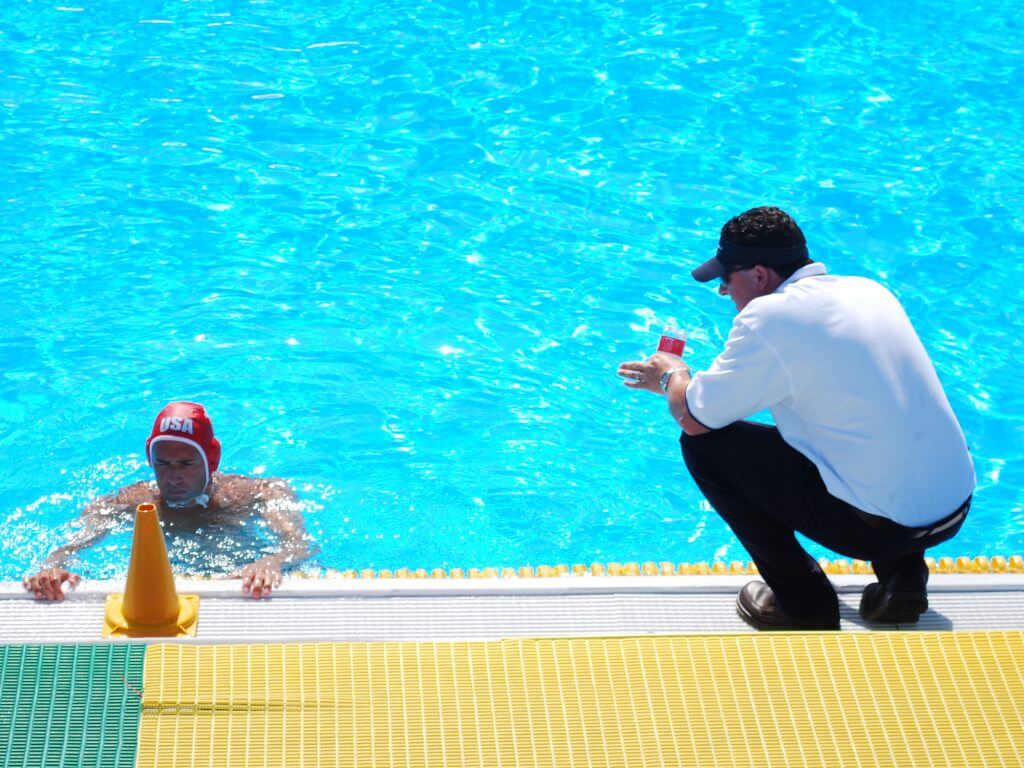
By Michael Randazzo, Swimming World Contributor
Loyalty—a sometimes contentious attribute—is still valued by the United States military, where longevity is both encouraged and rewarded. Count Ryan Brown as one who’s grateful for this; after seven years as assistant men’s water polo coach at the Air Force Academy, he was recently elevated to head pilot for Falcons’ polo.
Arriving in Colorado Springs in 2011, Brown served under Lieutenant Colonel Jeff Heidmous, who during multiple stints leading Air Force registered a 328-327-1 record, the best in program history. Included in Heidmous’ accomplishments are five NCAA appearances, the last being 2012, Brown’s second year with the Falcons.
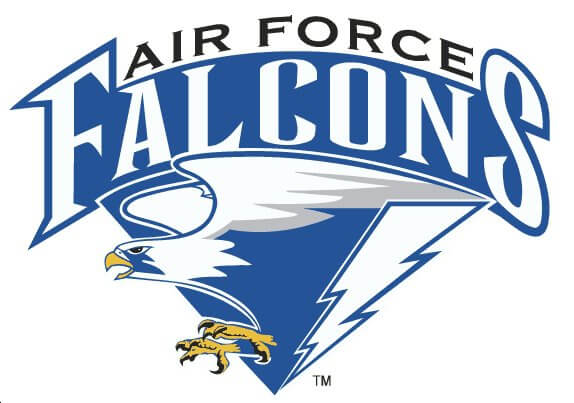
For his coaching exploits, Heidmous, who retired last spring, was elected to the United States Water Polo Hall of Fame. Not that Brown, a Tustin, California native, is any slouch. Prior to his time at Air Force, he spent six years as an assistant for the USA Men’s Senior National Water Polo Team (2006 – 2011), a tenure that included a silver-winning effort by Team USA at the 2008 Olympics in Beijing.
Before working with the men’s national team, Brown spent six seasons as head women’s water polo coach at the University of the Pacific, where he played from 1997-2000. He also served as an assistant coach for the Tigers’ men’s team during the 2002 and 2003 seasons.
Last week Swimming World contacted Brown about his time on the Falcon bench, the challenges of coaching at one of America’s three service academies, and the prospects for Air Force water polo—now and in the years to come.
– You’re replacing Jeff Heidmous, the most successful water polo coach in Air Force history. But Coach Heidmous’ work is not new to you—you’ve been on the Falcon pool deck the last seven years. What has that experience taught you about the program and how will that help Air Force get back to the NCAA men’s tournament?
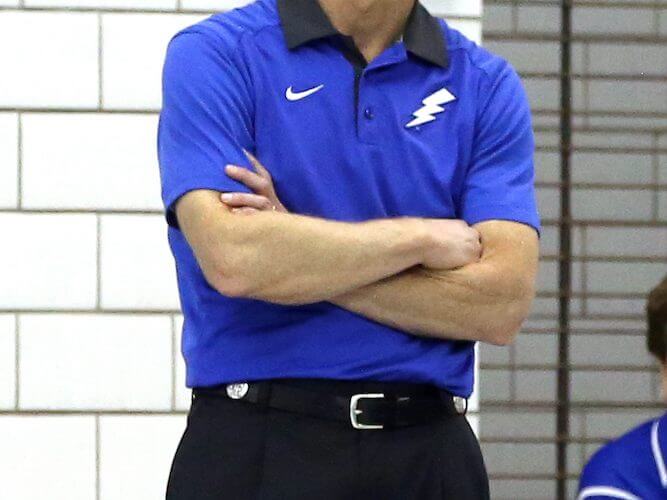
Jeff Heidmous. Photo Courtesy: Air Force Athletics
Coach Heidmous is a legend here at the Academy and not just for water polo. I have learned many things from him about the Academy, Academy life and Falcon water polo. Being around Coach, the athletes and other cadets for the last seven years has given me a real good perspective of the Academy and its life style.
With this knowledge I will continue our team’s upward and positive trend. As far as getting back to the NCAA Men’s Tournament, that’s a different story. The landscape of men’s NCAA water polo has changed. Winning our conference used to be a direct path to the NCAA Tournament, both when it was an eight- and four- team tournament. Now winning the WWPA puts you on a path with one or two play-in games to try and make the tournament.
– What are the prospects for your squad going into 2018 and how will the Falcons perform in WWPA conference play, and also when taking on some of the best teams in the country in non-conference play?
Season always comes quick for the fall sports at the Academy. Not being able to have the team together in the summer makes August a rush to be ready for the first weekend in September. With that we will be ready to play. We open with Cal at the Triton Tournament then possibly play three conference opponents. We will approach one game at a time and have certain things to work on each game. Afterwards we will reflect to see if we met those expectations.
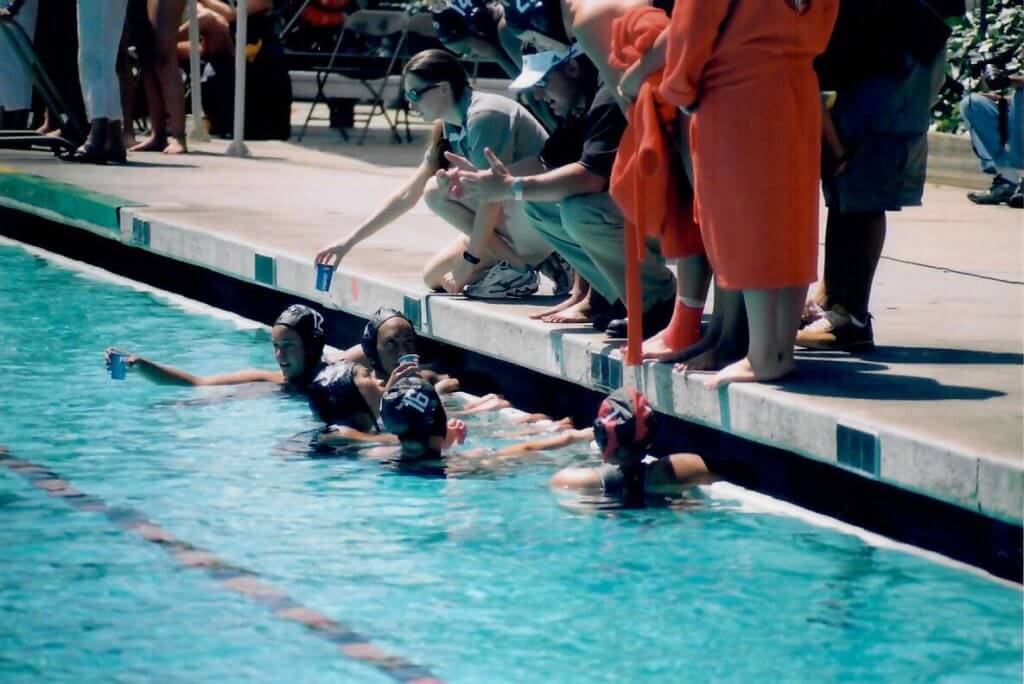
Brown coaching at University of Pacific. Photo Courtesy: Ryan Brown
It does not matter which teams we are playing, each game will be approached with the same level of concentration, focus and effort. The WWPA is very competitive. I believe that we are in the mix of the top teams in our conference, and winning our conference is always a team goal.
We are going to need all of our guys to contribute to the teams efforts, all understanding their roles and the part that they play. We need to be the true SUM of our Parts.
– What makes the service academies noteworthy is that they provide exceptional opportunities to those who will become our country’s leaders. The standard for success at the Air Force Academy is therefore quite high. How challenging is it to find athletes who can compete at polo and also fit the mold of a prospective officer in the world’s finest military force?
This place is special and it takes a special person to come here and be a part of this great institution. On top of that, competing at the Division I level is even more impressive.
These young men that I have the privilege to coach daily are really something rare—and I get to help mold them into our future leaders. I do not take that task lightly. The bar at the Academy is set very high in all aspects, but with that high goal it’s easier for each of them to soar above the rest and really get the most out of being an athlete at the DI level as well as a graduate of this fine institution.
When looking out in the water polo world for future leaders of this nation it is not easy, we are getting very-well rounded individuals looking not only to have a DI experience but also who are going to serve our nation at the greatest level.
Each year I am extremely proud of the future officers that we send out into the Air Force but also those coming in willing to answer the call for their nation.
– You don’t come from a military background but you’ve got ample experience in the sport—with stints at Pacific as both a player and a coach and with the U.S. Senior Men’s National Team. What makes coaching at a service academy distinctive—and what challenges do you have to contend with that don’t exist at other NCAA varsity programs.
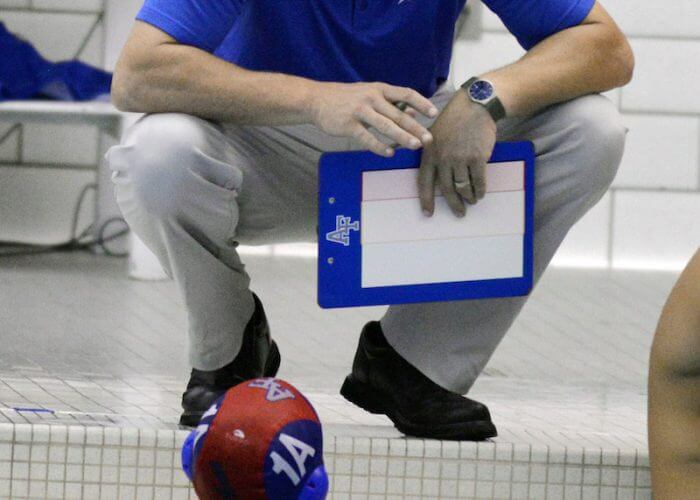
Ryan Brown. Photo Courtesy: Air Force Athletics
I do not come from a military background but I have been here a while and have learned a lot about the Academy and the military in my time. I was recruited to come here [as a high school athlete]. I tell that story when I am talking with kids and parents. I have a different story from Coach Heidmous but I think it is just as valuable not coming from the military side and being able to tell both sides of the story.
What makes these kids special is everything they are able to handle on a daily basis. Not only are they doing the 20 hours a week for athletics but they are carrying 15 units per semester (often more than that) and doing daily military duties on top of that. So there’s no time to just hang out; most of their daily time is taken up doing something.
With that being said they become very good at time management and organization. They plan ahead and are ready for multiple things all at one time. One thing to remember as well, is that these kids are only here for four years. There is not a fifth year of school or having a red shirt year. It is get in, get out in four years.
At times it is difficult to coach here at the Academy but I also understand and fully support why these kids are here and what they are going to be doing in their future. I play a significant role in that and am 100% believe in the mission here at the Academy.
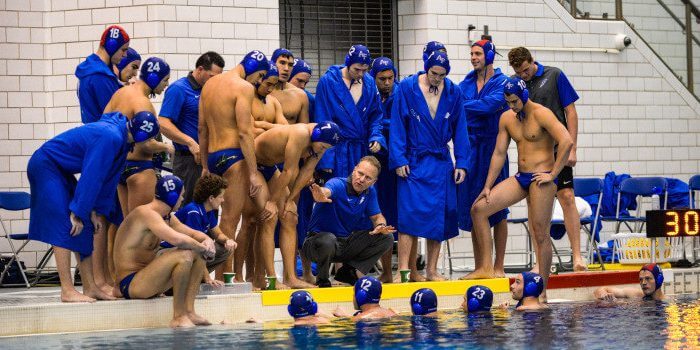
Photo Courtesy: Liz Copan
– It’s not common for Navy and Air Force water polo will go toe-to-toe next month at Princeton. What might this rivalry match mean to two programs looking to get back on the winning track?
Playing this game between the Academies is really important, it was a tradition that was lost for a long time and has been renewed the last three years. It is something that Coach [Luis] Nicolao and I plan on continuing for the future. We both have some great ideas about how to make it happen as well as possibly getting Army back involved, which would be great.
Bragging rights are always part of it as well as helping our school in the overall standings vs. the other Academies. This is a little earlier in the season than we have played the last three years so it will be interesting how that goes for both teams. It will be both team’s first game of the weekend so that will be a nice start for one of us.
The greatest thing about playing Navy is that even though it is a Academy Rivalry game, the players at the end of the game have the upmost respect for each other. We all know what the other is dealing with, what they will be doing in the future and why they are doing it.



